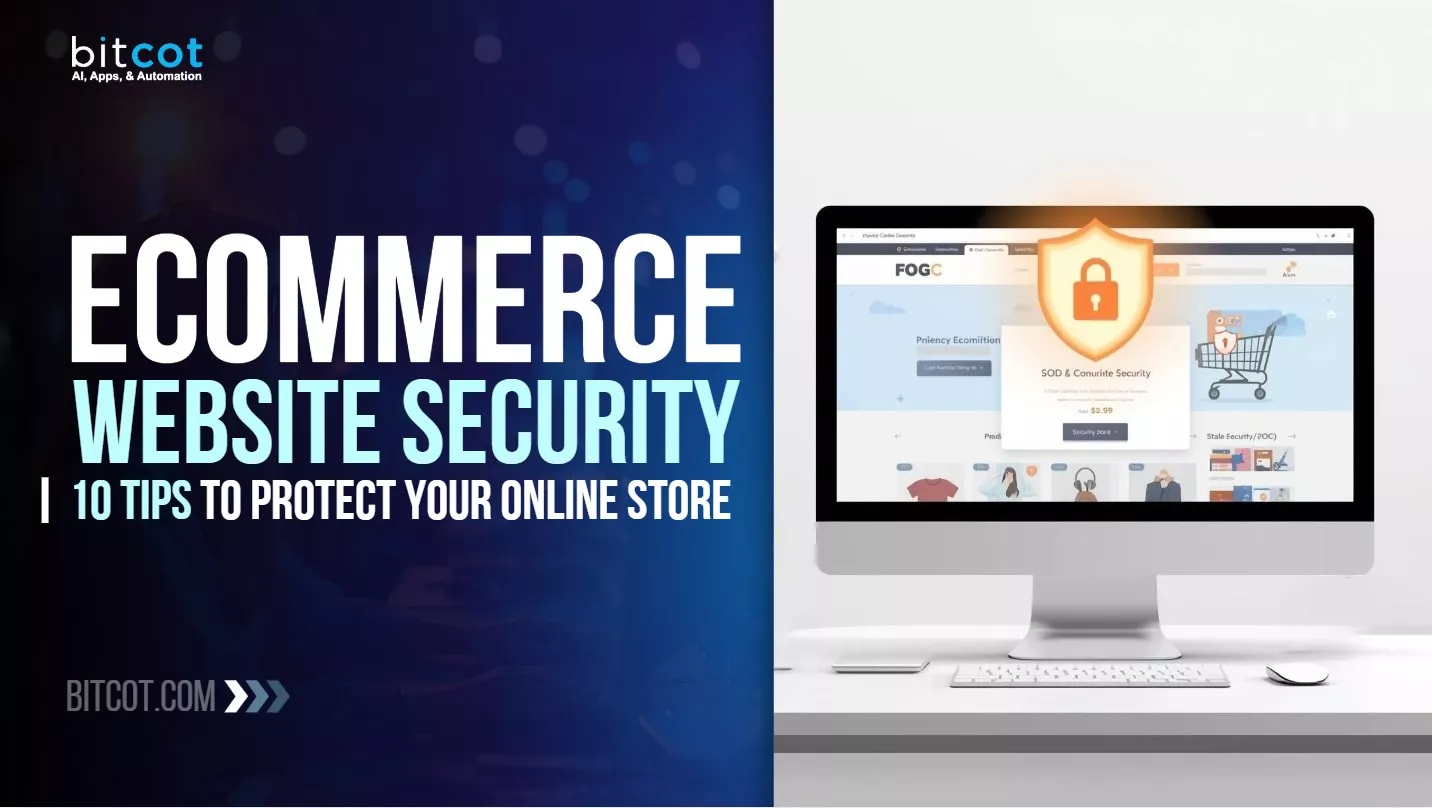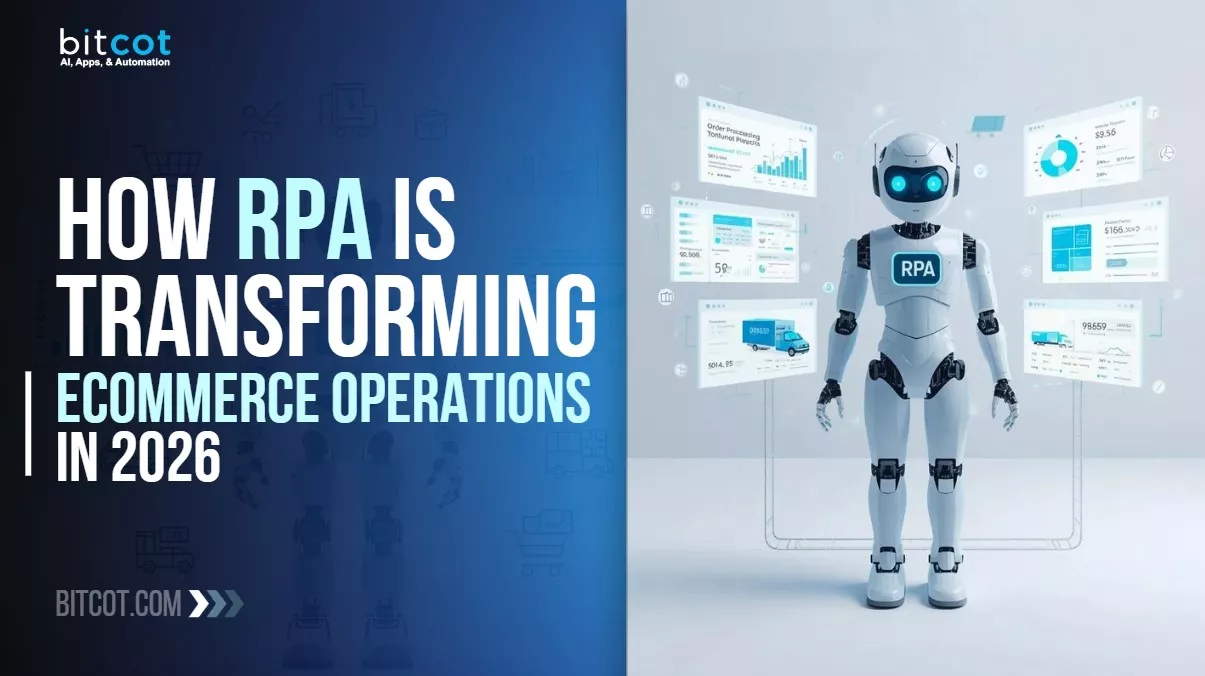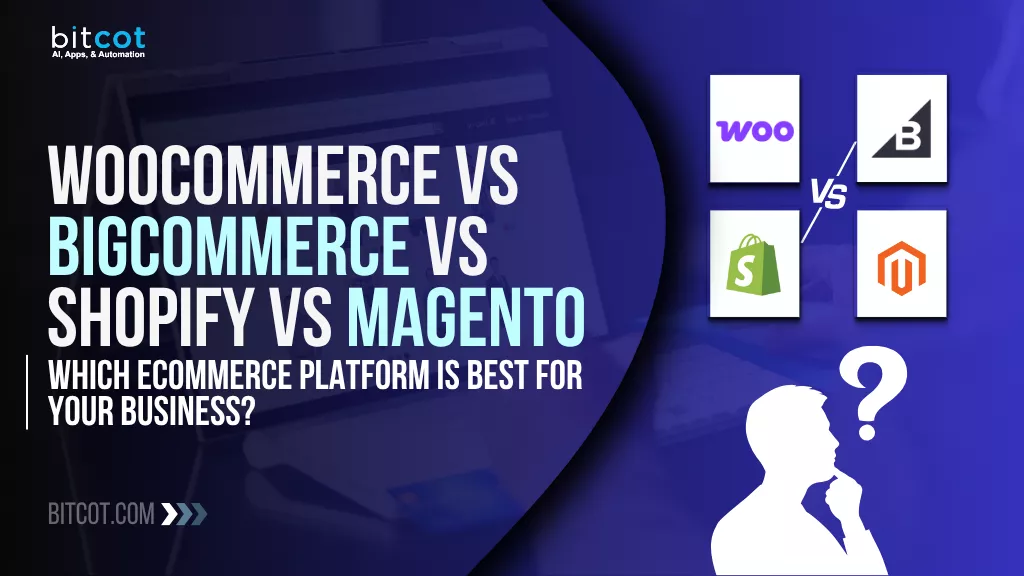
You’ve spent weeks researching the “best eCommerce platform, but the more you read, the more confused you get, right?
Do you want to modernize your eCommerce store or migrate to another platform? The answer lies below.
Every platform promises speed, scalability, and success, yet when it’s time to choose, it suddenly feels like walking through fog. WooCommerce offers freedom, Shopify provides speed, BigCommerce delivers power, and Magento gives you control. But which one actually fuels your long-term growth?
The truth is, the wrong platform can quietly limit your growth. It can slow your site, increase hidden costs, reduce flexibility, and force you to adapt to systems that do not fit your operations. The right choice, however, becomes the foundation for sustainable success.
Ask yourself:
- Are you managing a store that takes too much technical effort?
- Are plugins, extensions, or hidden fees eating into your profits?
- Is your current platform flexible enough to grow with your business?
- Are you getting the performance, control, and support you need to scale?
You already know these challenges, but where are you now? Are you still comparing platforms? Are you wondering which one can actually deliver measurable business results?
If you are a non-technical founder or business owner, you need a platform that simplifies operations and accelerates growth.
If you are a CTO or technical leader, you need flexibility, control, and scalability without compromising performance or security.
At Bitcot, we have helped startups, SMBs, and Fortune 500 companies build and scale their digital commerce ecosystems. We understand that what works for a boutique retailer might not suit a B2B enterprise managing thousands of products or multiple regional stores.
That is why we focus on aligning technology with your business strategy. We do not believe in one-size-fits-all solutions. We believe in helping you choose, build, and optimize an eCommerce platform that delivers real, measurable value.
In this guide, we will explore the strengths, weaknesses, and ideal use cases for WooCommerce, BigCommerce, Shopify, and Magento. By the end, you will have the clarity to choose the platform that supports your business today and empowers your growth tomorrow.
Your eCommerce platform is more than a storefront. It is your growth engine. The sooner you choose the right one, the faster you scale.
What is WooCommerce? Features, Benefits, and Ideal Use Cases

WooCommerce is an open-source eCommerce plugin for WordPress that powers approximately 20% of online stores globally. It’s highly flexible, cost-effective, and customizable, making it one of the most popular choices for growing businesses.
Key Features:
- Seamless WordPress integration
- Thousands of free and paid extensions
- Built-in product management and checkout tools
- Open-source code for full customization
- Extensive SEO and blogging capabilities
Benefits:
WooCommerce offers unmatched flexibility for businesses that want to fully own and control their online store. You can customize your website, add functionality with plugins, and leverage WordPress’s powerful CMS for content-driven marketing.
Ideal For:
- Businesses already using WordPress
- Brands prioritizing SEO and content marketing
- Companies wanting full control over hosting and customization
At Bitcot, we help brands transform WooCommerce into scalable eCommerce engines – integrating CRM systems, payment gateways, and custom plugins while maintaining top-tier performance and security.
BigCommerce Overview: Key Features and Advantages for Growing Enterprises
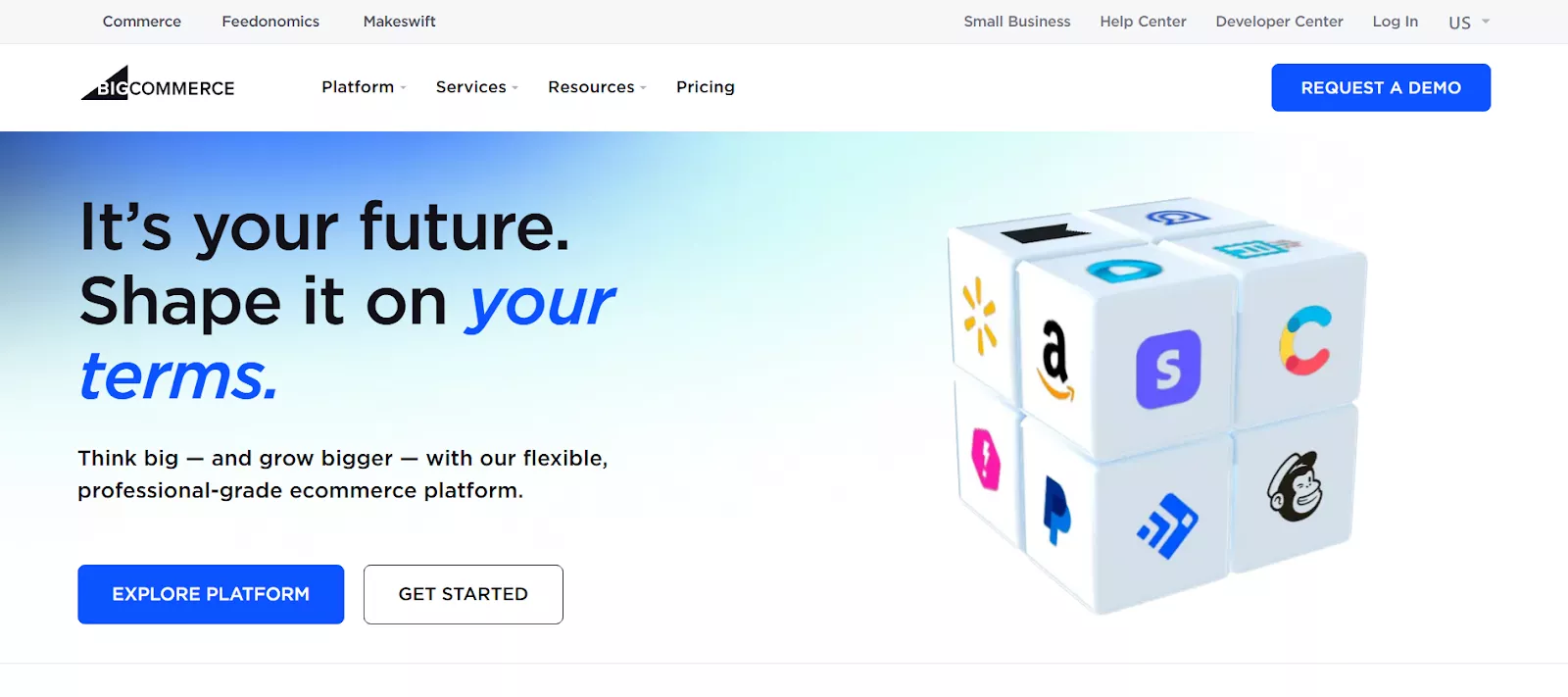
BigCommerce is a cloud-based SaaS platform that combines simplicity with enterprise-grade scalability. It’s designed for businesses that need robust infrastructure, built-in B2B tools, and API-driven flexibility.
Key Features:
- Cloud hosting with 99.99% uptime
- API-first architecture (ideal for headless commerce)
- No transaction fees
- Multi-storefront management
- Built-in SEO and omnichannel selling tools
Advantages:
BigCommerce provides a balance between usability and enterprise-level functionality. It integrates seamlessly with ERP, CRM, and POS systems while supporting cross-channel sales on Amazon, eBay, and social media platforms.
Ideal For:
- Mid-market to large enterprises
- B2B or hybrid B2B/B2C operations
- Businesses planning rapid scale
We recommend BigCommerce for growing brands ready to move beyond Shopify’s limits but not yet to Magento’s complexity. Our team builds headless commerce solutions connecting BigCommerce backends with custom React or Next.js frontends, combining flexibility with SaaS reliability.
What is Shopify: Why It’s Popular Among Startups and Large Businesses

Shopify has revolutionized online retail with its plug-and-play approach. Known for its simplicity, it enables entrepreneurs to launch fully functional stores without writing a single line of code.
Key Features:
- Drag-and-drop store builder
- 12,000+ apps and themes
- Managed hosting and PCI compliance
- Multichannel sales support (Amazon, eBay, Facebook, TikTok)
- Integrated payment gateway (Shopify Payments)
Advantages:
Shopify’s biggest strength is its ease of use. From design to checkout, it offers a frictionless experience. Its app store allows businesses to extend features instantly, while Shopify Plus caters to high-volume merchants and global brands needing automation and scalability.
Ideal For:
- Startups and small businesses
- Non-technical founders
- Fast-moving D2C brands
At Bitcot, we help U.S. startups accelerate growth by launching Shopify stores optimized for SEO, conversions, and user experience. Our expert Shopify development services also support migrations to Shopify Plus or BigCommerce as businesses scale, ensuring a seamless and high-performance eCommerce experience.
Magento (Adobe Commerce) Overview: Enterprise-Level Power and Flexibility
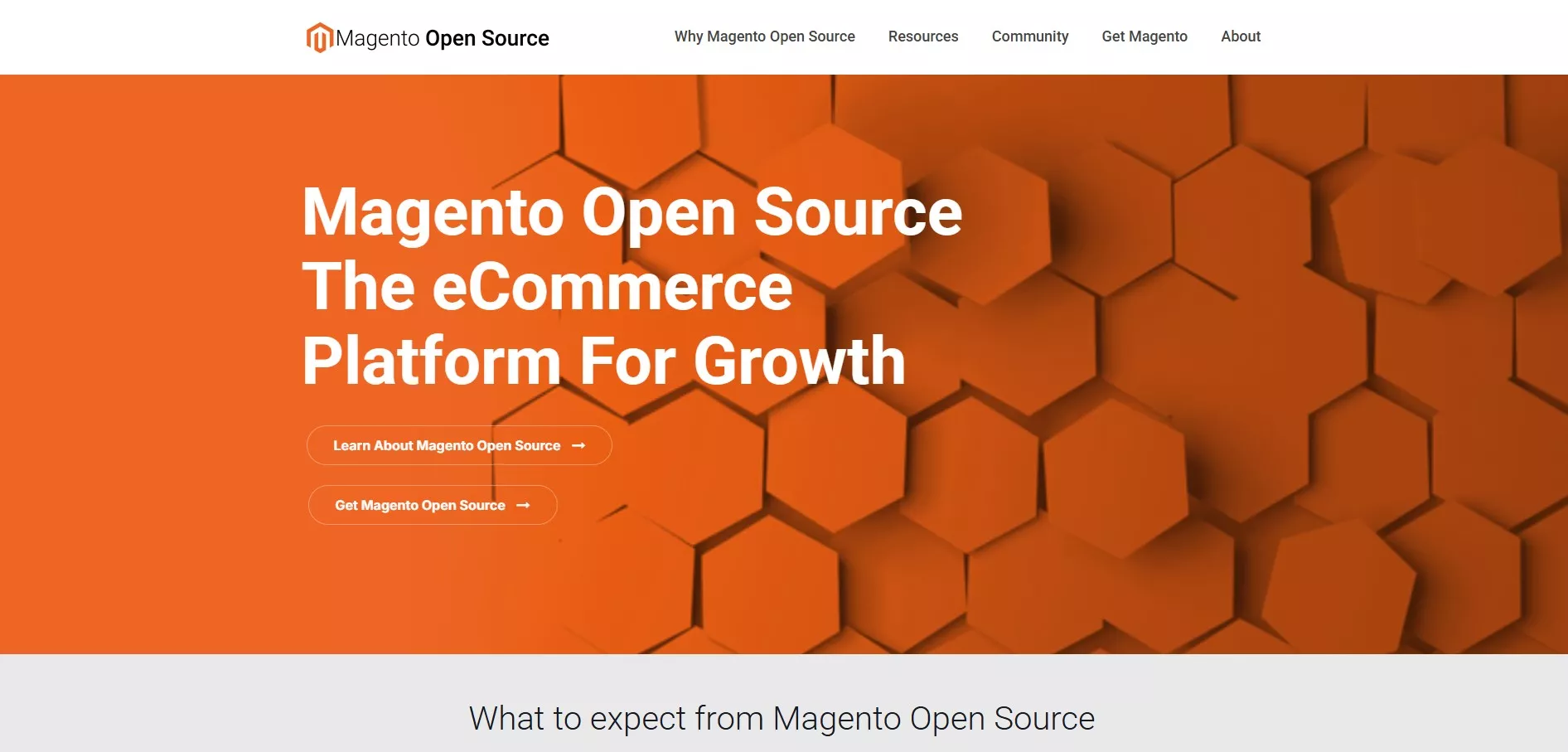
Magento, now known as Adobe Commerce, is the most powerful eCommerce solution for large-scale businesses. It’s designed for enterprises managing multiple stores, high transaction volumes, and complex integrations.
Key Features:
- Advanced product and order management
- Custom workflows, permissions, and automation
- API and headless architecture support
- B2B-ready capabilities
- Highly extensible through Adobe’s ecosystem
Advantages:
Magento provides complete flexibility and control. Businesses can customize everything – from front-end design to back-end architecture. However, it requires technical expertise or a development partner like Bitcot to maintain and optimize performance.
Ideal For:
- Enterprises with large catalogs
- Global brands requiring advanced customization
- Companies needing integrations with ERP, CRM, or AI systems
Our Magento development services include custom module development, performance optimization, and enterprise integration, enabling Fortune 500-level eCommerce capabilities with robust data management.
Ease of Use Comparison: WooCommerce vs BigCommerce vs Shopify vs Magento
Ease of use determines how quickly you can launch and how efficiently your team can manage daily operations. For many founders, it’s the difference between scaling confidently and being bogged down by technical overhead.
Shopify remains the leader in simplicity. Its visual editor, intuitive dashboard, and guided onboarding make it ideal for non-technical founders. Everything – from inventory to order fulfillment – is accessible in a few clicks, allowing teams to focus on marketing instead of maintenance.
BigCommerce follows closely with a more enterprise-leaning interface. It caters to growing businesses that need built-in analytics, multi-channel sales, and advanced configuration. The learning curve is steeper initially, but high-volume operations become manageable once you’re familiar with the system.
WooCommerce integrates deeply with WordPress, offering rich content management alongside commerce features. This flexibility is powerful but requires setup knowledge around hosting, SSL, and plugins. The WordPress familiarity many teams already have can significantly reduce the learning curve.
Magento is the most complex, offering developer-grade control through its modular architecture. It’s built for CTOs and technical teams who need complete customization freedom, making it unsuitable for businesses without dedicated development resources.
In our experience, platform choice often aligns with team structure: startups thrive on Shopify’s simplicity, content marketers prefer WooCommerce, growing companies choose BigCommerce, and enterprises leverage Magento’s power.
Customization and Flexibility Features
Customization defines how well your eCommerce platform can reflect your brand identity and support unique business models.
WooCommerce allows complete creative freedom through its open-source foundation. You can design unique storefronts, modify checkout flows, and integrate subscription or marketplace modules. Developers have full access to extend or modify core functionality.
Shopify offers strong visual customization via themes and the Liquid templating language. Backend modifications are limited on standard plans, but the extensive app ecosystem covers most business needs. Shopify Plus unlocks additional Shopify Customization capabilities for enterprise users.
BigCommerce bridges open-source flexibility and SaaS stability through its API-first framework. The headless commerce approach lets you build custom React or Next.js storefronts while maintaining BigCommerce’s reliable backend infrastructure.
Magento (Adobe Commerce) provides ultimate flexibility with modular architecture and B2B-ready features. Develop custom modules, integrate third-party tools, and manage multi-store operations – all with centralized control.
Bitcot often helps businesses design custom features like tiered pricing, loyalty systems, and AI-driven product recommendations. Choosing a platform that matches your growth roadmap – not just current needs – ensures long-term value.
Pricing Comparison: WooCommerce vs BigCommerce vs Shopify vs Magento
Pricing extends beyond monthly subscription fees to total cost of ownership (TCO), including hosting, extensions, transaction fees, and developer support. The right pricing model depends on your growth stage, technical capacity, and projected sales volume.
| Platform | Pricing Model | Estimated Monthly Cost | Hidden Costs | Hosting |
| WooCommerce | Free plugin | $30-$250 | Hosting, plugins, developer time | Self-hosted |
| Shopify | SaaS | $39-$399 (Plus from $2,000) | App add-ons, transaction fees (0.5-2%) | Included |
| BigCommerce | SaaS | $39-$399 (Enterprise custom pricing) | App add-ons | Included |
| Magento (Adobe Commerce) | Open Source / Enterprise | $0 (Open Source) / $22,000+ | Hosting, dev & maintenance | Self-hosted or Adobe Cloud |
WooCommerce appears cost-effective initially, but expenses increase with premium extensions and managed hosting. It remains the most flexible option for budget-conscious startups and content-driven brands.
Shopify offers predictable pricing, excellent for cash flow planning. However, transaction fees impact margins unless you use Shopify Payments, which may not be available in all markets.
BigCommerce eliminates transaction fees entirely, benefiting high-volume merchants significantly. Transparent pricing tiers automatically adjust as your annual revenue grows.
Magento targets enterprises with substantial budgets. The open-source version has no licensing cost but demands significant developer investment, making it ideal for companies prioritizing long-term control.
At Bitcot, we conduct comprehensive TCO analysis before platform selection, estimating 3-5 year costs while factoring in scalability, integrations, and performance requirements. This ensures your platform investment drives growth rather than creating financial burden.
Scalability and Performance: Which eCommerce Platform Grows with Your Business?
Scalability becomes critical as your business expands. Traffic spikes during sales events and consistent response times directly impact conversion rates and customer satisfaction.
Shopify and BigCommerce provide automatic cloud-based scaling. Their infrastructure adjusts resources during peak periods, maintaining site availability during promotions and holiday surges without manual intervention.
WooCommerce performance depends heavily on hosting infrastructure. With properly configured managed WordPress hosting, CDN integration, and caching strategies, it handles substantial traffic volumes effectively. Bitcot routinely optimizes these configurations for U.S. clients requiring enterprise-level performance through our WordPress Development Services.
Magento excels in high-volume enterprise environments. Its architecture supports multi-server clusters, database replication, and advanced caching through Varnish and Redis. Large corporations manage millions of products across global regions without performance degradation.
We implement intelligent scaling through AWS auto-scaling, cloud CDN distribution, and database optimization – ensuring fast load times and consistent uptime even during 10x traffic events.
Security and Maintenance Comparison: WooCommerce vs BigCommerce vs Shopify vs Magento
Security concerns are paramount for U.S. enterprises handling sensitive customer data. Beyond SSL certificates, businesses must address PCI DSS, GDPR, and SOC 2 compliance requirements.
Shopify and BigCommerce automate security management through their SaaS model. PCI compliance, SSL certification, and regular security patches occur without merchant involvement – a significant advantage for non-technical teams and fast-scaling startups.
WooCommerce provides full security control alongside full responsibility. Businesses manage updates, plugin security, and server-level protections. Bitcot implements automated security layers, DDoS protection, and vulnerability scanning to minimize risks for self-hosted environments.
Magento (Adobe Commerce) delivers enterprise-grade security. Adobe’s cloud solution provides automatic patching and compliance support, while on-premise deployments allow customization for specific regulatory frameworks.
Maintenance requirements vary significantly. While Shopify and BigCommerce users enjoy hands-off updates, WooCommerce and Magento require ongoing optimization. Bitcot Managed eCommerce Services provide continuous updates, backups, and security monitoring – combining SaaS reliability with open-source flexibility.
SEO and Marketing Tools Comparison
Search visibility and marketing capabilities determine how effectively your store attracts, engages, and converts customers.
WooCommerce excels in SEO through WordPress integration. Control URLs, meta tags, structured data, and blog content from a unified dashboard. WordPress eCommerce Plugins like Rank Math and Yoast optimize content-rich commerce experiences.
Shopify provides essential SEO features including meta editing and automatic sitemaps, though URL and structural control are somewhat limited. Integrated marketing tools – Shopify Email, social commerce, and marketing automation – compensate for these restrictions.
BigCommerce balances SEO and marketing with built-in schema markup, Google AMP support, and headless SEO capabilities. Native integrations with HubSpot and ActiveCampaign enable sophisticated full-funnel automation.
Magento offers advanced SEO flexibility for enterprise marketers managing complex product catalogs. Deep integrations with Adobe Experience Cloud and AI-powered personalization tools drive sophisticated marketing strategies.
Our team enhances SEO and marketing across all platforms by integrating AI-driven automation, CRM synchronization, and custom analytics dashboards. Tools like Klaviyo, Mailchimp, and HubSpot enable behavior tracking, audience segmentation, and personalized campaigns that directly influence ROI.
Support, Community, and Resources
Support quality determines how quickly your team resolves issues and adapts to changing business requirements.
Shopify and BigCommerce lead in customer support with 24/7 live chat, email, and phone coverage. This constant availability is essential for businesses operating across multiple time zones.
WooCommerce leverages a massive global developer community. While official support is limited, the open-source ecosystem provides abundant solutions, tutorials, and certified development partners.
Magento (Adobe Commerce) maintains a strong developer network and enterprise support structure. High-value clients receive dedicated account managers for strategic guidance.
We complement platform support with end-to-end technical services, proactive monitoring, and ongoing maintenance. We help clients minimize downtime, manage version upgrades, and resolve complex integration challenges – ensuring infrastructure reliability long after launch.
Pros and Cons of WooCommerce, BigCommerce, Shopify, and Magento
Understanding the trade-offs between these four leading platforms helps align platform choice with your technical readiness and business goals.
| Platform | Pros | Cons |
| WooCommerce | Highly flexible, excellent for SEO, low entry cost | Requires technical setup and ongoing maintenance |
| Shopify | Quick setup, reliable hosting, 24/7 support, ideal for SMBs | Limited backend customization, transaction fees |
| BigCommerce | Enterprise-ready, built-in scalability, no transaction fees | Learning curve for advanced configurations |
| Magento (Adobe Commerce) | Unmatched customization, B2B features, multi-store support | High cost and technical complexity |
WooCommerce suits agile teams wanting full tech stack ownership. Shopify excels in speed and simplicity for idea validation. BigCommerce occupies the enterprise sweet spot with balanced capabilities. Magento dominates in flexibility for global operations.
The Bitcot team frequently guides businesses through phased platform strategies, starting with Shopify or WooCommerce for cost efficiency and later migrating to BigCommerce or Magento at growth inflection points.
Feature Comparison Table (2025-26 Edition)
This comprehensive comparison examines how each platform performs across critical business dimensions, based on current 2025-26 capabilities, industry feedback, and Bitcot implementation experience across hundreds of U.S. eCommerce projects.
| Feature | WooCommerce | Shopify | BigCommerce | Magento (Adobe Commerce) |
| Ease of Use | Moderate (WordPress skills required) | Excellent (no coding) | Good (slight learning curve) | Complex (developer needed) |
| Customization | Excellent (open-source) | Moderate | High (API-first) | Excellent (enterprise-level) |
| Scalability | High (with managed hosting) | High (SaaS scaling) | Excellent (multi-channel scaling) | Excellent (cloud or on-prem) |
| SEO | Excellent | Good | Very Good | Excellent |
| Integrations | Excellent (plugins) | Excellent (apps) | Excellent (APIs) | Excellent (ERP, CRM, PIM) |
| B2B Features | Add-ons available | Available via Plus | Built-in | Native |
| Security | Manual updates | Automatic | Automatic | Enterprise-grade |
| Support | Community-based | 24/7 | 24/7 | Enterprise & community |
| Cost Range | $30-$250 | $39-$399+ | $39-$399+ | $0-$22,000+ |
| Best For | Content-driven stores | Startups & SMBs | Growth-stage & mid-enterprise | Enterprise & global brands |
No single platform dominates every category – each fits specific business contexts. Your optimal choice depends on whether you prioritize speed, customization, control, or scalability.
Which eCommerce Platform Is Best for Your Business?
Now that we’ve examined features and performance, let’s match each platform to the business types it serves best.
For Startups and Entrepreneurs:
Shopify wins for speed-to-market and simplicity. It’s perfect for entrepreneurs launching without technical resources. Bitcot accelerates startup launches with optimized stores focused on conversions and user experience.
For Content-Driven or SEO-Heavy Brands:
WooCommerce dominates content-first strategies. If organic traffic, blogs, and content storytelling drive your marketing, WordPress integration provides unmatched advantages. Bitcot configures high-performance WooCommerce stores that convert organic traffic into sustainable revenue through our WooCommerce Development Services.
For Mid-Size and Scaling Businesses:
BigCommerce offers a natural upgrade path for companies outgrowing Shopify. API-based scalability, ERP integrations, and multi-store management support rapid expansion. Bitcot expertise in headless BigCommerce implementations enables advanced, design-rich frontends with SaaS backend stability through our BigCommerce Development solutions.
For Enterprises and Global Brands:
Magento (Adobe Commerce) remains unrivaled for enterprise capabilities. Complex catalogs, international operations, and extensive customization requirements align perfectly with Magento’s architecture. Bitcot Adobe-certified team builds scalable ecosystems for high-performance operations across multiple regions.
The right platform aligns with your long-term digital strategy. Bitcot recommends evaluating options based on scalability, security, and ecosystem support over 5+ years – not just immediate costs.
Final Verdict
Choosing between WooCommerce, BigCommerce, Shopify, and Magento is a strategic business decision affecting marketing agility, operational efficiency, and ROI.
- For speed and simplicity: choose Shopify
- For flexibility and SEO dominance: WooCommerce is your ally
- For scalability with enterprise readiness: BigCommerce delivers
- For complex infrastructure or multiple markets: Magento (Adobe Commerce) is the powerhouse
The real differentiator isn’t the platform – it’s how you build, optimize, and scale it. With over a decade of experience developing and scaling eCommerce platforms across industries – from healthcare to retail to AI-driven automation – Bitcot helps U.S. businesses unlock digital growth with technology tailored to their unique models.
Whether you’re a non-technical founder, a CTO planning platform migration, or an enterprise leader pursuing omnichannel expansion, Bitcot development and strategy team can evaluate, design, and implement your ideal solution through Custom eCommerce Development.
Your eCommerce platform isn’t just a storefront. It’s your growth engine.
Partner with Bitcot, a leading eCommerce development company in the USA, to design, develop, and optimize your online business for performance and profit.
Frequently Asked Questions (FAQs)
Shopify is the ideal choice for small businesses and startups that need quick setup, minimal technical knowledge, and reliable hosting. Its intuitive drag-and-drop interface allows entrepreneurs to launch fully functional stores within days without writing code. With 24/7 support, automatic security updates, and a vast app ecosystem, Shopify removes technical barriers so founders can focus on growth and customer acquisition. Yes, platform migration is entirely possible with proper planning and execution. Bitcot specializes in seamless eCommerce migrations between Shopify, WooCommerce, BigCommerce, and Magento with zero data loss. We transfer products, customer data, order history, and SEO elements while minimizing downtime. Our migration process includes thorough testing, URL redirects for SEO preservation, and post-launch support to ensure business continuity. Magento (Adobe Commerce) and BigCommerce are purpose-built for enterprise scalability. Magento offers unmatched customization for complex catalogs, multi-store operations, and global expansion with advanced B2B capabilities. BigCommerce provides enterprise-ready infrastructure with API-first architecture, making it perfect for businesses requiring headless commerce, ERP integrations, and omnichannel selling – all without transaction fees that impact high-volume operations. WooCommerce leads in SEO capabilities due to its deep integration with WordPress, the world’s most SEO-friendly CMS. You gain complete control over URLs, meta tags, structured data, and content marketing through plugins like Rank Math and Yoast SEO. The platform’s flexibility allows custom schema markup, blog integration, and content-driven commerce strategies that significantly boost organic search rankings and drive sustainable traffic growth. Total cost of ownership varies significantly. WooCommerce starts at $30-$250 monthly including hosting and plugins, making it cost-effective for bootstrapped startups. Shopify ranges from $39-$399 monthly (Shopify Plus from $2,000) with additional app costs and transaction fees. BigCommerce offers similar pricing without transaction fees, benefiting high-volume merchants. Magento requires substantial investment – from $0 for open-source to $22,000+ annually for Adobe Commerce, plus hosting and developer costs. Platform selection depends on your business stage, technical resources, and growth trajectory. Choose Shopify for rapid launch and simplicity. Select WooCommerce for content marketing and SEO dominance. Opt for BigCommerce when scaling beyond Shopify’s limitations while avoiding Magento’s complexity. Pick Magento for enterprise requirements like multi-store management, complex integrations, and extensive customization. Bitcot recommends evaluating your 3-5 year roadmap, not just immediate needs. Shopify and BigCommerce provide automatic security through their SaaS infrastructure – including PCI DSS compliance, SSL certificates, and continuous security patches without merchant intervention. This makes them ideal for non-technical teams. WooCommerce and Magento offer enterprise-grade security but require active management. Bitcot implements comprehensive security layers for self-hosted platforms, including DDoS protection, automated updates, vulnerability scanning, and compliance monitoring. Bitcot provides end-to-end eCommerce solutions across all major platforms. Our services include strategic platform selection, custom development, seamless migration, performance optimization, third-party integrations (ERP, CRM, PIM), headless commerce implementation, and ongoing maintenance. With over a decade of experience and hundreds of successful U.S. eCommerce projects, we transform platforms into revenue-generating engines. Whether you’re launching your first store or scaling to enterprise operations, our team delivers tailored solutions that drive measurable ROI.
Which eCommerce platform is best for small businesses and startups in 2025-26?
Can I migrate my eCommerce store from one platform to another without losing data?
Which platform handles enterprise-level growth and scalability best?
Which eCommerce platform is best for SEO and organic traffic growth?
What are the true costs of running an eCommerce store on each platform?
How do I choose between WooCommerce, Shopify, BigCommerce, and Magento?
Which platform offers the best security and PCI compliance?
How can Bitcot help with my eCommerce platform selection and development?



